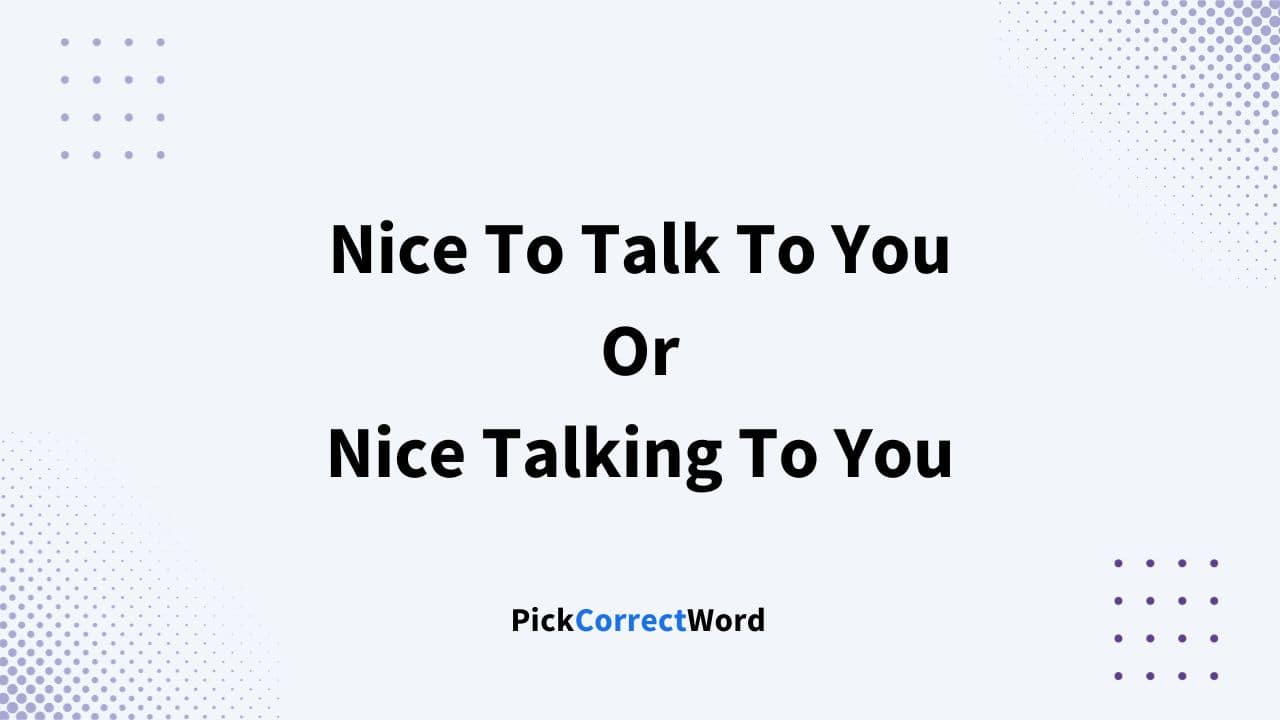People you talk to every day probably say things like nice to talk to you or nice talking to you to end a conversation politely.
Both these phrases mean the same thing, but they are used in slightly different situations. When you speak English, choosing the right phrase can help you make a good impression.
You generally use ‘nice to talk to you’ at the beginning of a conversation after greeting someone. This sets a nice mood for the conversation.
“Nice talking to you,” on the other hand, is usually said at the end of a conversation to show that you enjoyed it.
Meaning and Usage: Nice to Talk to You and Nice Talking to You
Nice to talk to you is typically employed in two main contexts:
- Before conversation: “I’ve heard a lot about you. Nice to talk to you.”
- During conversation: “This has been an enlightening discussion. Nice to talk to you.”
The phrase nice to talk to you in the above contexts suggests that you enjoy/are enjoying speaking to this person.
Nice talking to you, on the other hand, is generally used at the conclusion of an interaction as a polite and affirmative closure.
- End of conversation: “I need to head off now. Nice talking to you.”
Applying the Phrases in Conversations
Here are more examples of the use of the phrases nice to talk to you, and nice talking to you:
Before or Mid-conversation
During a conversation, especially in a formal setting, you can say:
“It’s always nice to talk to you.”
“I just wanted to say, it’s always nice to talk to you about our upcoming projects.”
“Before we dive into the details, I must say, it’s always nice to talk to you, Sarah.”
“I find it nice to talk to you whenever we discuss our team’s progress.”
Ending Conversations Politely
When concluding an interaction, whether it has been a casual meet-up or a formal meeting, you can say:
“It was nice talking to you, we must do this again.”
“It was great catching up with you. Nice talking to you, and let’s plan something again soon.”
“I really enjoyed our conversation. Nice talking to you, and have a wonderful day!”
“Time flew by! Nice talking to you; we should definitely continue this discussion later.”
Polite alternatives to ‘nice to talk to you’
When a formal tone is desired, especially in a professional setting, you can opt for phrases such as
“It was a pleasure to catch up,”
This conveys a respectful and polite sentiment. This phrase is suitable for business emails after a meaningful conversation with a colleague or client.
Saying something like “Looking forward to our next meeting,” reflects a pleasant interaction and expresses eagerness for future meetings.
Polite alternatives to ‘nice talking to you’
When you’re wrapping up a conversation, you might want to express appreciation or recognition in a courteous and professional way. Here are some alternatives for you to the typical phrase “nice talking to you.”
“It was a pleasure to chat with you”
“I enjoyed our conversation”
“I appreciate our discussion”
Frequently Asked Questions
How should I express ‘It was nice talking to you’ in a professional email?
In a professional email, you might write, “I appreciate the opportunity to discuss [topic]. It was a pleasure speaking with you.” This keeps your tone professional while acknowledging the value of the conversation.
What does it mean when someone says, ‘It was nice talking to you’?
When you say, “It was nice talking to you,” you’re expressing that you found the conversation pleasant and enjoyed the interaction. You typically use this phrase when wrapping up a conversation.
How can I convey ‘It was nice talking to you’ when referring to a conversation that took place yesterday?
You could say something like, “Thinking back on our conversation yesterday, I really enjoyed our exchange and the insights that were shared.” This makes a clear reference to the last conversation and keeps the tone of thanks.
What are some formal ways to say ‘It was nice talking to you’ after an extended period of not communicating?
For a conversation between individuals who haven’t communicated in a while, saying “It was great to catch up and to hear about [topic/updates]. I very much enjoyed our conversation,” offers a formal and warm acknowledgment of the interaction and the passage of time.


